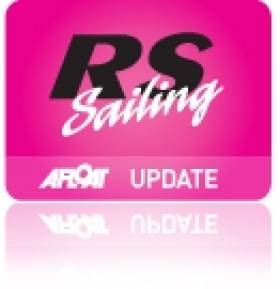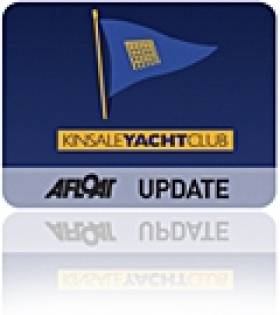Displaying items by tag: Simon Brien
Cowes, Isle of Wight: 11th June 2022. Russell Peters and his crew of James Grant and Greg Wells snatched a narrow lead at the end of the third day of the Brewin Dolphin RS Elite International Grand Prix.
Northern Ireland Dragon ace Simon Brien from Belfast Lough is lying fifth having won a race on the opening day of the event.
Peters who is representing the host club, the Royal Yacht Squadron, was finally able to discard his second black flag disqualification from his scoreline, and is now a slender two points ahead of Hayling Island’s Ossie Stewart.
The second discard came into force when the fleet had completed nine out of the ten race series. Russell Peters sailing Riff Raff has scored five first places, a third and then a ninth in the ninth race, discarding two black flags. With the wind forecast to go light and shifty on Sunday for the last race of the regatta, anything could happen.
 The Brewin Dolphin RS Elite International Grand Prix fleet race downwind in Cowes Photo: Paul Wyeth
The Brewin Dolphin RS Elite International Grand Prix fleet race downwind in Cowes Photo: Paul Wyeth
Commenting on the coming showdown he said, “it could be a bit tense tomorrow, I think the conditions will be better than predicted.” Talking about his string of wins he said, “we seem to have good speed, if we can get off the line cleanly and go the right way the boat is quick.”
Olympic medallist Ossie Stewart, crewed by his son Tom and Geoff Carveth, has been a consistent performance throughout the regatta, with a string of top four places until the ninth race when he slumped to 14th. Currently in third place overall is Tom Hewitson also from Hayling Island, twenty points behind Stewart.
With just the one race scheduled for Sunday, the final day of the regatta, there is likely to be some very tactical match racing between Peters and Stewart with all to play for.
The Solent laid on its sparkling best today, with sunshine and a good breeze in the 15 to 20 knot range, Russell Peters describing it as “fabulous conditions, it was so good to be out there.
Results:
- Russell Peters Royal Yacht Squadron 17pts
- Ossie Stewart Hayling Island S.C. 13pts
- Tom Hewitson Hayling Island S.C. 29pts
- Martin Jones Royal Yacht Squadron 41pts
- Simon Brien Royal North of Ireland Y.C. 43pts
- Paul Fisk Emsworth S.C. 53pts
NI Dragon Champion Challenges for RS Elite Title in Cowes
#rselite – Belfast lough's Simon Brien who won last month's Dragon class Edinburgh cup on home waters is switching boats to challenge for the RS Elite Nationals in Cowes next week.
Hosted by the Royal Yacht Squadron in Cowes with the forty boat fleet moored in their harbour next to the Castle, the setting could hardly be better. This alone would make the occasion stand out for many sailors who've read in awe about the Club and the prestigious regattas they've hosted through their illustrious history.
Competition is always tight and the biggest ever fleet of these one-design keelboats will only make it closer. Five past Elite Champions have entered, a number of other Elite owners who've held National titles in other classes and virtually every RS Elite class Cowes Week, Scottish Series and Irish Nationals winner will also be on the start line! It's hard to know where to start trying to pick favourites for the 2012 title.
Jono Brown in Aeolus from Burnham is the defending champion – Brien in Kin from Northern Ireland recently won the Dragon Edinburgh Cup in his other boat – Crauford McKeon in Kandoo III from Lymington dominated at the previous biggest Elite championship in 2010 – Shaun McClean in Elixir from Scotland won in 2009 and was runner-up last year.... The list goes on... It will take tactical consistency and the best boat set-up to produce what it takes to win in all conditions for this one.
And there is another factor - RS Elite sailors enjoy the craic and there is a fantastic social programme throughout the regatta. Add sponsorship by the superb Wight Vodka, inevitable rounds of wonderfully drinkable cocktails and their slogan of "tack and gybe responsibly" will be highly salient! The social side of the event means everyone will have a good time no matter what the outcomes on the water. "The reputation of the RS Elite fleet's competitive racing and high-energy socials has gained incredible momentum" says Ritu Manocha of Wight Vodka. "We are psyched to be associated with such a dynamic group of individuals!"
RS Elite sailor and event director Charlie Egerton-Warburton from the Royal Yacht Squadron says "The stage is set for an exhilarating 2012 RS Elite Championships. Our club is really looking forward to welcoming RS Elite sailors from across the country, indeed globe. Seven of the forty entrants are associated with Island clubs, and thus we are making steady progress towards our objective of establishing a large Elite fleet around the Island. Importantly, we have worked hard to infuse the regatta with an Island theme throughout, not least of course via the generous title sponsorship of my personal favourite Wight Vodka. We wish everyone a wonderful regatta."
Dragons Prepare for South Coasts in Kinsale
Kinsale Yacht Club hosts the Irish Dragon South Coast Championships from 10 - 12 September 2010.
A very competitive fleet of 18 Dragons will assemble in Kinsale this weekend for the final Championship of the Irish calendar with both the South Coast title and
valuable ranking points for both the World and European Championship qualification on offer.
Though this is a helmsman's championship the importance of an established and cohesive crew on a Dragon is crucial when determining favorites. Neil Hegarty, Peter Bowring and David Willams (Phantom) have excelled on the waters under the Old Head in recent years taking two consecutive National Championships in 2007 and 2009. However, they have always been pushed hard by Martin Byrne (Jaguar) who won the last edition of the South Coast Championships held in Kinsale in 2008 with his son Conor and constant collaborator Pedro De Andrade. Along with several other stellar teams from both the Royal St George and the Royal Irish, including current National Champion Don O'Donoghue (Seabird), is perennial favorite Simon Brien (Kin) from the Royal North of Ireland.
Kinsale Yacht Club has been selected to host the Dragon Gold Cup 2012 and the Kinsale Dragon fleet will be hoping to end the Dun Laoghaire domination of
recent years.
Olaf Sorensen, Martin Payne and Shawn Kingston (Christianna) will lead the challenge with Cameron Good, Henry Kingston and Simon Furney (Little Fella) another long-established team pushing hard for a breakthrough this year. Class Captain Anthony O'Neill with Donal Small and his son Eoghan (Tenacious) have sailed consistently well this season however; Tim Cronin, Caroline Matthews and Harry Lewis (Jee) have found a rich vein of form following a prolonged lay-off and could prove the surprise package.
The courses will be Windward-Leeward and six races will be sailed, with two races each day back to back. Friday promises very interesting conditions with fresh to strong southwesterly winds though the breeze set to moderate throughout the weekend. Principal Race Officer Alan Crosbie and his team will commence proceedings on Friday morning with another scintillating Dragon regatta in prospect.
- Martin Byrne
- Kinsale Yacht Club
- Irish Dragon South Coast Championships
- Neil Hegarty,
- Peter Bowring
- David Willams
- Pedro De Andrade
- Don O'Donoghue
- Simon Brien
- Olaf Sorensen
- Martin Payne
- Shawn Kingston
- Tim Cronin
- Caroline Matthews
- Harry Lewis
- Alan Crosbie
- Henry Kingston
- Cameron Good
- Simon Furney
- Dragon Gold Cup 2012

























































